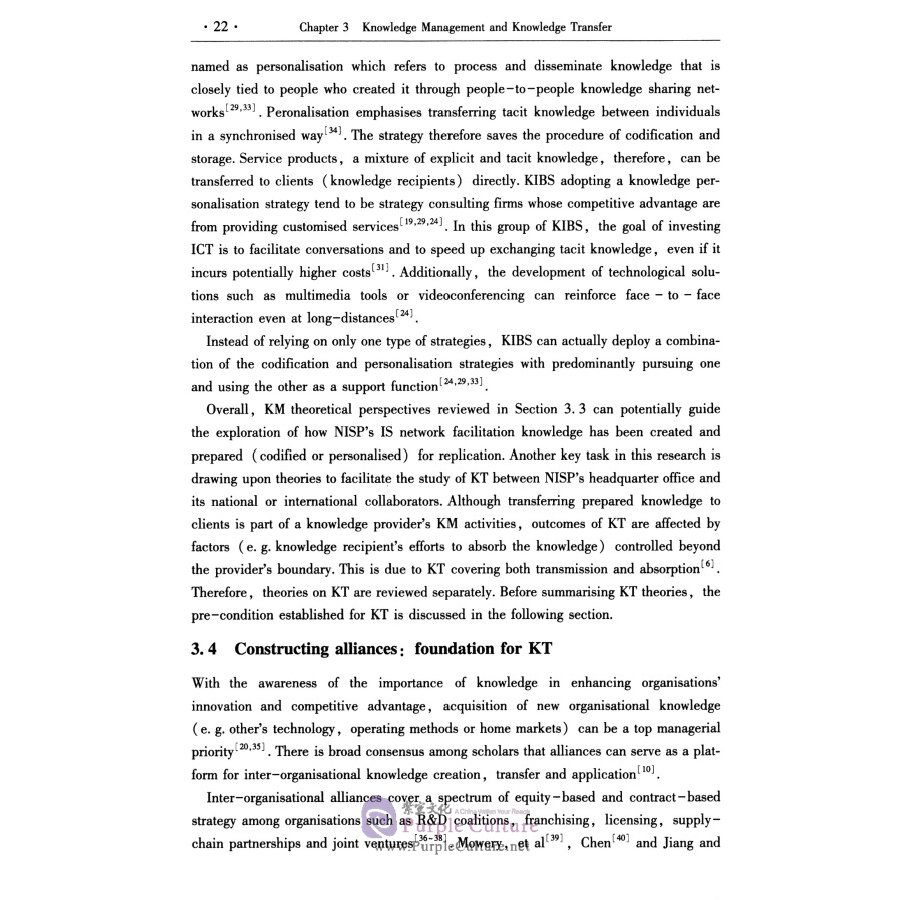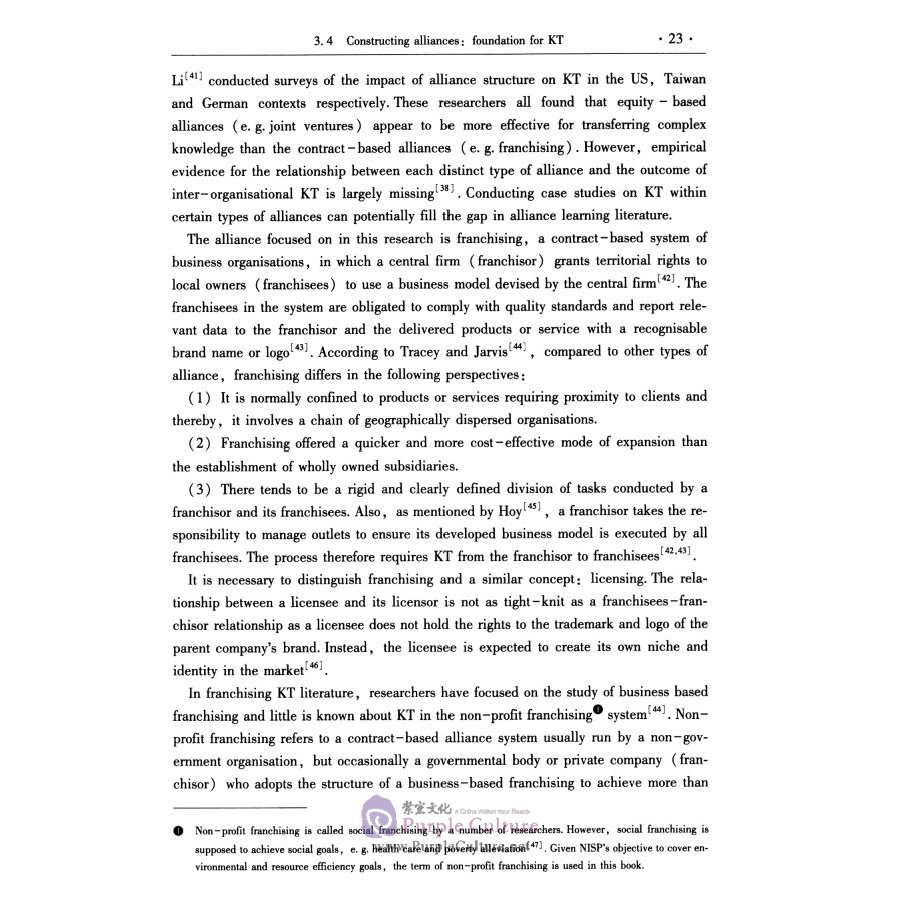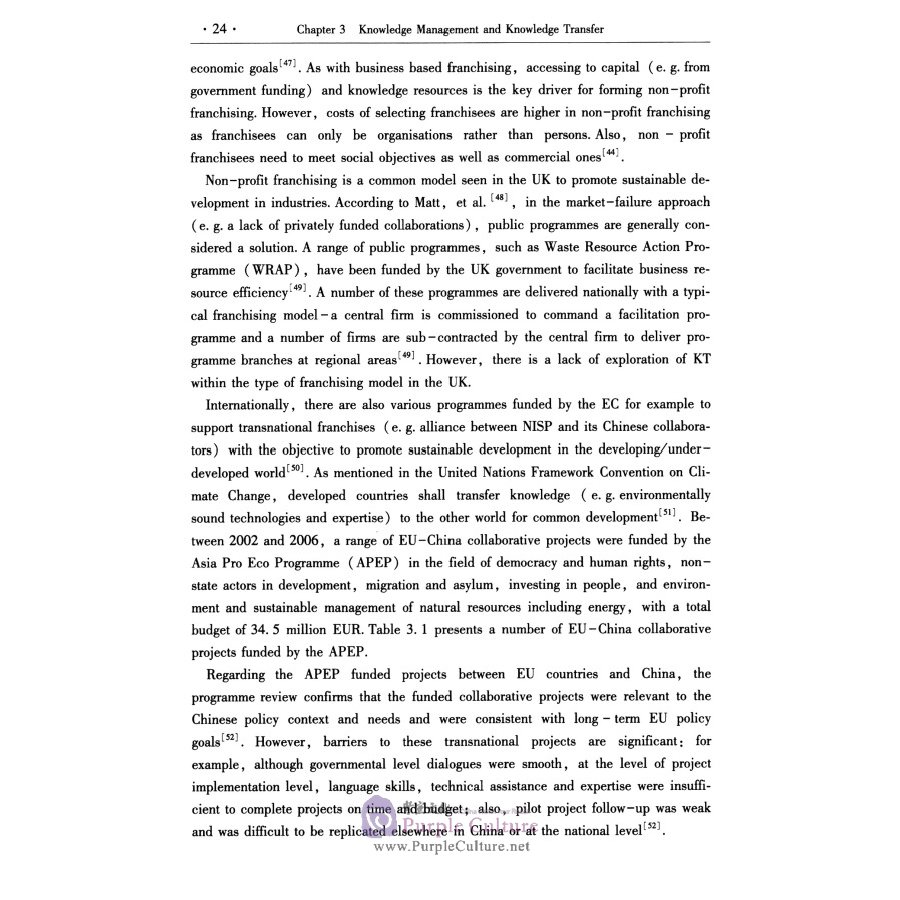Table of Contents
Chapter 1 Introduction
References
Chapter 2 Research on IS
2.1 Introduction
2.2 Research on characterising IS activities
2.2.1 Locating the IS theory in a broader theoretical framework
2.2.2 Understanding IS activities
2.3 Exploring the significance of the transferred knowledge
2.3.1 NISP's IS network facilitation approach: a good practice or not?
2.3.2 The Chinese ISD status: Is there potential for the facilitated IS network approach?
2.4 Summary
References
Chapter 3 Knowledge Management and Knowledge Transfer
3.1 Introduction
3.2 Organisational knowledge: definitions and taxonomies
3.2.1 Understanding the concept of organisational knowledge
3.2.2 Organisational knowledge taxonomies
3.3 KM in KIBS organisations
3.3.1 Knowledge creation
3.3.2 Strategies to process organisational knowledge for dissemination
3.4 Constructing alliances: foundation for KT
3.5 Initiation of KT processes
3.5.1 Knowledge dissemination processes in a knowledge provider's system
3.5.2 Knowledge learning processes in a knowledge recipient's system
3.6 Determinants of KT processes
3.6.1 Provider's internal factors affecting its knowledge dissemination process
3.6.2 Recipient's internal factors affecting its knowledge learning process
3.6.3 Context factors affecting KT processes
3.7 Qualitative case study approaches for KT research
3.8 Summary
References
Chapter 4 Methodology
4.1 Introduction
4.2 Philosophical paradigm and research methodology
4.2.1 Underlying philosophical assumptions
4.2.2 Qualitative-interpretive research methodology
4.3 Research design and fieldwork
4.3.1 Research design/approach
4.3.2 Field-work
4.4 Data analysis
4.4.1 Principles of data analysis
4.4.2 Data analysis strategy
4.5 Research validity
4.5.1 Criteria exploration
4.5.2 Consideration of the validity
4.6 Ethical considerations
4.7 Summary
References
Chapter 5 Policy Contexts Affecting ISD in the UK and China
5.1 Introduction
……
Sample Pages Preview



Studying in UK is a very impressive and exciting experience in my life. The major topic of the book was shaped based on my supervisors' guidance. Hereby, I would like to express my appreciation to my supervisors, Pauline Deutz, David Gibbs, and Xiudian Dai for guiding my research methodology and contributing energy and time for my research. As an intemational student from China, I would like to study something that could contribute to the sustainable development of my home country. I was therefore encouraged to select a transnational low carbon development project as a case study, focusing on the process and mechanism of knowledge transfer, and to provide advice to this type of intemational collaboration.
This research adopted a qualitative research method with all interview data collected through travelling to branches of the studied UK organisation (the National Industrial Symbiosis Programme) and its Chinese collaborator (TEDA Eco-centre). To seek the knowledge perspective of the UK-China collaboration, large quantity of energy was paid to understand how to promote industrial symbiosis in the two countries. Fortunately, doing interviews in the UK were more smoothly than I thought. Normally, shortly after I sent an email requiring doing an interview, people (practitioners engaging in promoting industrial symbiosis) just agreed. None of them ever showed the reluctance of sharing any information. Also, I was recommended by one of them to contact their Chinese collaborator. I am sincerely grateful to people in Intemational Synergies Limited and TEDA eco-centre that provided internship opportunities for me to be involved in field. Through a short period of working with amiable colleagues in the two organisations, I received substantial advice for my research and life.
How to deal with the large quality of collected qualitative data was a question. Luckily, thanks for University of Hull offering a qualitative research module. The module deeply inspired my selection of data analysis method,and I began to classify the knowledge data into various types. I insisted that promoting the development of industrial symbiosis or circular economy is never a pure environment protection knowledge. It also includes policy, business and management knowledge. This book therefore discusses how various types of knowledge transferred nationally and intemationally for industrial symbiosis development.
After completing my doctorate research, I came to work with Wuhan University of Science and Technology.l always reflected my research conducted in the UK and paid spare time to revise the content for publication. Thanks to the research funds from National Natural Science Foundation of China (project code: 41701627) and Wuhan University of Science and Technology that help to publish the book.
Due to limited professional knowledge and the preparation of time, there may be some shortcomings in the book, sincerely hope that readers can correct.


